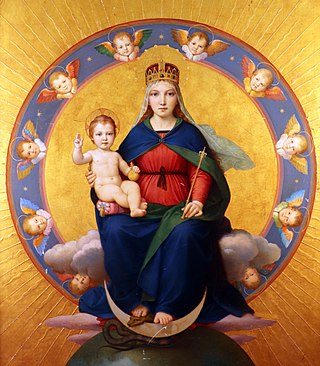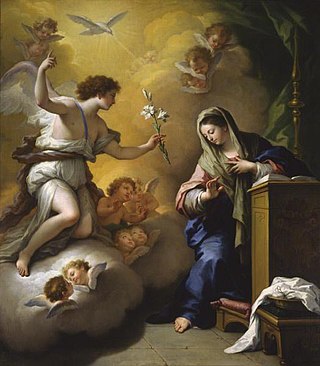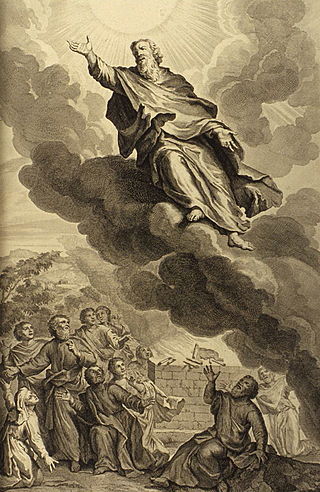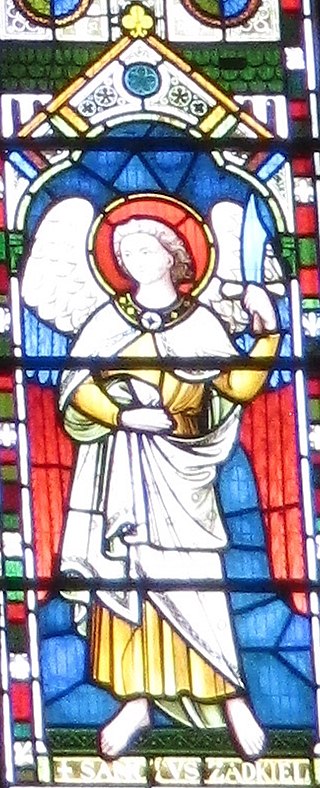Footnotes
- ↑ Alexander 1983, p. 258.
- 1 2 Odeberg 1928, p. 12.
- 1 2 3 Davidson 1967, p. 301.
- 1 2 Oliver & Lewis 2008, p. 373.
- ↑ Gettings 1988, pp. 231–233.
Uziel (or Usiel) is an archangel mentioned in some variants of 3 Enoch (but Ouza in others), [1] [2] [3] in a variant of Sefer Raziel HaMalakh, [3] [2] [4] in Johannes Trithemius's Steganographia, [5] and in John Milton's Paradise Lost . [3] [4]

The Bible is a collection of religious texts or scriptures that are held to be sacred in Christianity, Judaism, Samaritanism, and many other religions. The Bible is an anthology – a compilation of texts of a variety of forms – originally written in Hebrew, Aramaic, and Koine Greek. These texts include instructions, stories, poetry, and prophecies, among other genres. The collection of materials that are accepted as part of the Bible by a particular religious tradition or community is called a biblical canon. Believers in the Bible generally consider it to be a product of divine inspiration, but the way they understand what that means and interpret the text can vary.

The Epistle of Jude is the penultimate book of the New Testament as well as the Christian Bible. It is traditionally attributed to Jude, brother of James the Just, and thus possibly brother of Jesus as well.

Apocalypse is a literary genre in which a supernatural being reveals cosmic mysteries or the future to a human intermediary. The means of mediation include dreams, visions and heavenly journeys, and they typically feature symbolic imagery drawn from the Hebrew Bible, cosmological and (pessimistic) historical surveys, the division of time into periods, esoteric numerology, and claims of ecstasy and inspiration. Almost all are written under pseudonyms, claiming as author a venerated hero from previous centuries, as with Book of Daniel, composed during the 2nd century BCE but bearing the name of the legendary Daniel.

Archangels are the second lowest rank of angel in the hierarchy of angels. The word "archangel" itself is usually associated with the Abrahamic religions, but beings that are very similar to archangels are found in a number of other religious traditions.

Enoch is a biblical figure and patriarch prior to Noah's flood, and the son of Jared and father of Methuselah. He was of the Antediluvian period in the Hebrew Bible.

Metatron, or Mattatron, is an angel in Judaism mentioned three times in the Talmud, in a few brief passages in the Aggadah, and in mystical Kabbalistic texts within Rabbinic literature. The figure forms one of the traces for the presence of dualist proclivities in the otherwise monotheistic visions of both the Tanakh and later Christian doctrine. The name Metatron is not mentioned in the Torah or the Bible and how the name originated is a matter of debate. In Islamic tradition, he is also known as Mīṭaṭrūn, the angel of the veil. In folkloristic tradition, he is the highest of the angels and serves as the celestial scribe or "recording angel".

The Book of Enoch is an ancient Hebrew apocalyptic religious text, ascribed by tradition to the patriarch Enoch who was the great-grandfather of Noah. The Book of Enoch contains unique material on the origins of demons and Nephilim, why some angels fell from heaven, an explanation of why the Genesis flood was morally necessary, and prophetic exposition of the thousand-year reign of the Messiah. Three books are traditionally attributed to Enoch, including the distinct works 2 Enoch and 3 Enoch. None of the three books is considered to be canonical scripture by the majority of Jewish or Christian church bodies.

Samuel Davidson was an Irish biblical scholar.

Sandalphon is an archangel in Jewish and Christian writings, although not in scripture. Sandalphon figures prominently in the mystical literary traditions of Rabbinic Judaism and early Christianity, notably in the Midrash, Talmud, and Kabbalah and is generally seen as gathering prayers and passing them on to God.
Seraphiel is the name of an angel in the apocryphal Book of Enoch.

Raziel, is an angel within the teachings of Jewish mysticism who is the "Angel of Secrets" and the "Angel of Mysteries”. He is also called "Keeper of All Magic." He is one of the angels associated with the sephirah Chokhmah of Kabbalah, alongside Jophiel.

Zadkiel, also known as Hasdiel, is an archangel in Jewish and Christian angelology.
Yahoel or Jehoel is the name of an angel appearing in the Old Church Slavonic manuscripts of the Apocalypse of Abraham, a pseudepigraphical work dating from after the siege of Jerusalem (70). He is an associate of Michael (Apoc.Abr.10:17) charged to restrain Leviathan and destroy idolaters (10:10–14).
Cassiel, is an angel appearing in extracanonical Jewish, Christian, and Islamic mystical and magical works, often as one of the Seven Archangels, the angel of Saturn, and in other roles.
Pravuil, also known as Vretil, is an archangel briefly mentioned in the Second Book of Enoch as God's scribe and recordkeeper. In Enoch II, God commands Pravuil to bring Enoch writing materials so he could document his journey through the heavens. Charles Russell Coulter and Patricia Turner argue that Pravuil is a Hebrew recasting of the Mesopotamian deity Nabu.

Barachiel is one of the Archangels in Judaism, as well as Byzantine Catholic and Eastern Orthodox tradition. He is the Archangel of Blessings.
The Third Book of Enoch is a Biblical apocryphal book in Hebrew. 3 Enoch purports to have been written in the 2nd century, but its origins can only be traced to the 5th century. Other names for 3 Enoch include The Book of the Palaces, The Book of Rabbi Ishmael the High Priest and The Revelation of Metatron.
In some Judeo-Christian traditions, the Angel of the Presence / Face or Angel of his presence / face refers to an entity variously considered angelic or else identified with God himself.
In 3 Enoch, the Song-Uttering Choirs are a collective class of angels who frequently sing the Trisagion and reside in Makon, the 5th Heaven, alongside the Ishim. If any of these angels fail to perform the Trisagion at the right time, they are consumed by fire. They are all under the direction of Tagas (תגעץ), the angel of music.
Chalkydri are mythical creatures mentioned in the apocryphal Second Book of Enoch from the 1st century CE, often seen as an angelic species. In the narrative, chalkydri dwell near the Sun and ran its course around the earth with it bringing heat and dew to the earth. The chalkydri and phoenixes are described as creatures with the head of a crocodile and the feet and tail like that of a lion, each having twelve wings, and are the color purple like the rainbow. The phoenixes in Greek myth are not the same mentioned here. At sunrise, all the chalkydri break into song with their counterparts, alerting the birds of the world for a new day to rejoice.